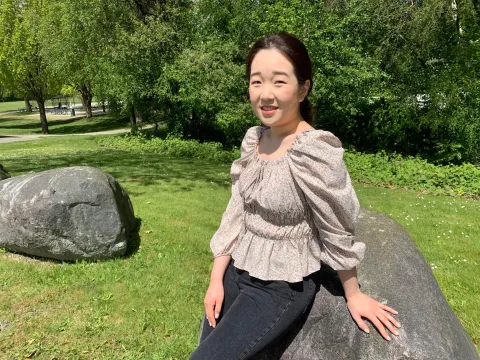"Nursing is so much more than just what happens at the bedside."

Leah Shin
- Degree:
- Bachelor of Science in Nursing
- Grad year: 2022
- Program:
I first became a UBC student in 2016 as I pursued a Bachelor of Science degree majoring in Biology. In 2019, during my third year, I unexpectedly had to withdraw from my studies due to a hospitalization. What at first seemed like a four-year straight path to a degree, suddenly became the most challenging time of my life. While things seemed uncertain, I was supported by an amazing team of nurses who motivated me and helped me through every step of my recovery. Moved by this experience, I applied for UBC’s Bachelor of Science in Nursing and started the program in 2020. Coming back to UBC for my nursing degree was a no-brainer as I knew I would be surrounded by peers who had diverse life experiences and brought unique perspectives to succeed in this accelerated program. Through my education, I gained exposure to many types of nursing and developed a passion for mental health and community health nursing. My unique final preceptorship placement at Insite performing overdose management along with complex wound care and community resource coordination, I have dedicated my practice to implementing harm-reduction in any care capacity.
Why did you choose to go into your field of study at UBC?
Prior to my hospital experience, I frankly did not know much about the role of nurses in patient care. There’s a lot of deep-rooted misogyny that plagues this career and much of my opinion on nursing was influenced by these stereotypes. However, through my firsthand experience as a patient, I learned that nurses are uniquely positioned to cultivate deeper relationships with their clients while being able to assume leadership positions in healthcare. We can spend most of our time at the bedside monitoring our patients and are responsible for advocating for their needs but can also use our unique perspectives to influence change in the healthcare system. Many community initiatives in the Downtown Eastside, such as the PHS Community Services Society, were started by nurses recognizing a need for resources to be readily available in marginalized communities. A nurse’s expertise is wide-ranging with the ability to have say in medical care while also liaising with social workers. I chose to be a nurse to be able to personally connect with my clients, recognize their needs, and perform integral work in their continuity of care.
Tell us about your experience in your program. What have you learned that is most valuable?
While pursuing my Bachelor of Science in Nursing degree, I was lucky enough to be elected Vice-President Academic of the Nursing Undergraduate Society. Being able to take on such a leadership role while studying helped enhance what I was learning in class. I would have lectures with Dr. Havaei about nursing leadership and policy but also be able to participate in the Undergraduate Program Committee with her and see nursing leadership be implemented in an education context. As student representative on this committee, I got to provide the student perspective on what experiencing online learning during a global pandemic was like and this could be brought forward to be implemented alongside classroom learning. Collaborating with nursing leaders while still in nursing school was an incredible privilege that has shaped how I view the possibilities that nursing can offer.
What advice would you give a student entering your degree program?
The most important thing you can do as a nursing student is define what work-life balance looks like for you as soon as possible. Coming into this career during the nursing shortage made me eager to take all the overtime as soon as I graduated. I thought that being a young and new nurse meant that I should have more energy to fix as much short-staffing as I could. This mentality gave me problems when I started to feel burnout shortly after spreading myself too thin at work and in school. The solution to the nursing shortage lies more in improving the working conditions for all nurses instead of working the few that we have to the bone. As a student nurse, learn to develop boundaries for what you’re willing to pick up and work just as hard to develop a life for yourself outside of nursing. The UBC BSN program draws many students with different life experiences to it, but it goes by extremely fast. Take this time to get involved and connect with your peers as these people will help you decompress after a 12-hour clinical shift. Pursuing interests and staying active through kickboxing and dance also helped remind me that there is so much more to life than just nursing.
How do you feel your degree has benefitted you compared to a different field of study?
Pursuing nursing allowed me to learn more about myself than I would have if I had pursued a different profession. I came into this career wanting to provide clients with the same level of care that I had received in the hospital. Going through nursing school showed me how much more there is to nursing than what I had experienced in my own care. Prior to this program, I was unaware of what nursing in the community looked like or what nursing research involved. Being able to go through this degree and become a nurse myself showed me how much opportunity is present in this career. With the demand for well trained nurses being so high, the ability to explore many different types of nursing exists and allows for new graduates feel more freedom when choosing their first jobs. Coming into nursing has allowed me to pursue more leadership positions and explore more avenues of healthcare that I previously would not have considered.


